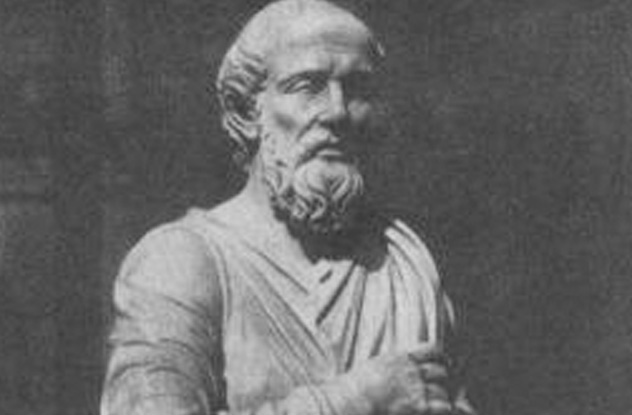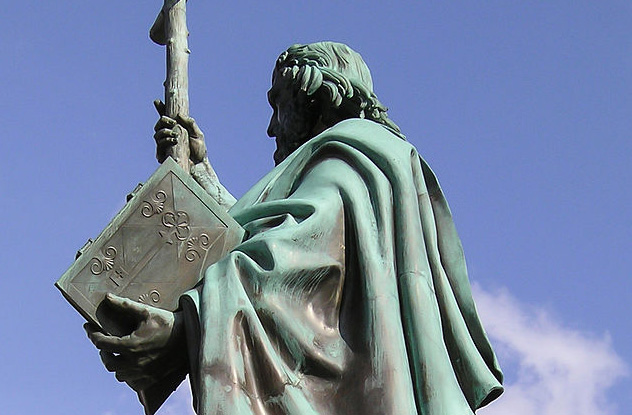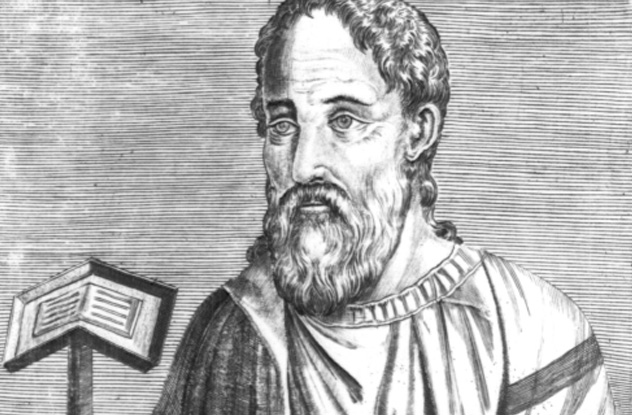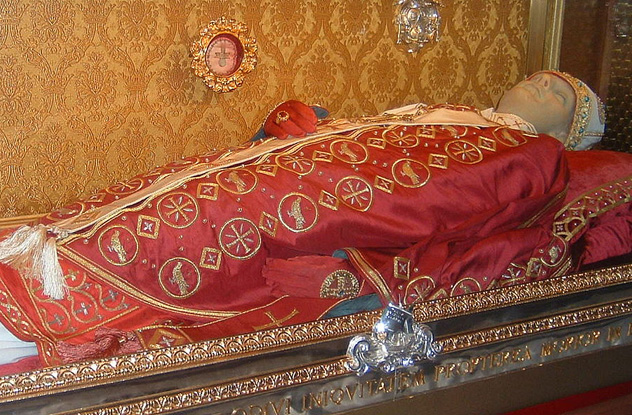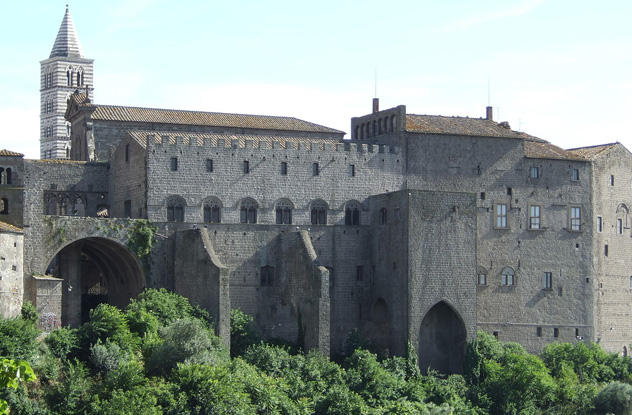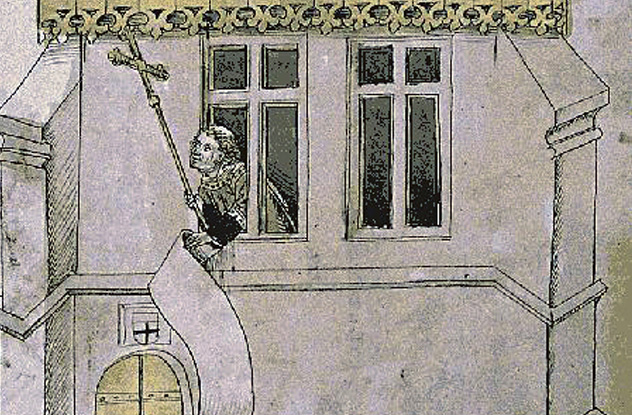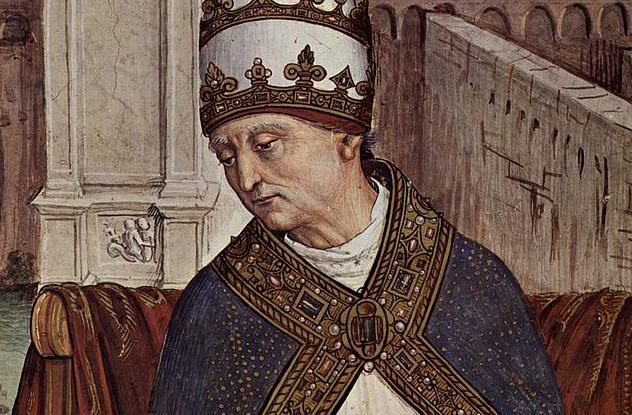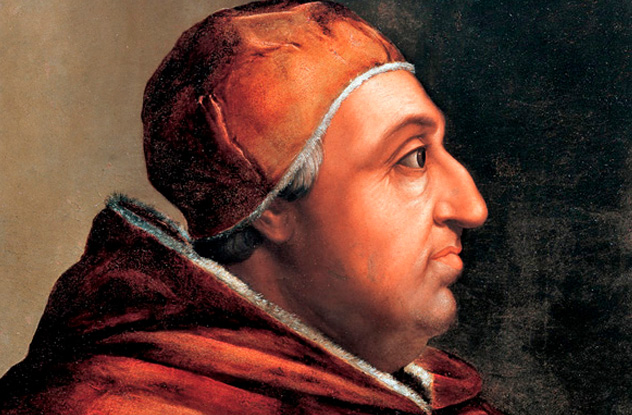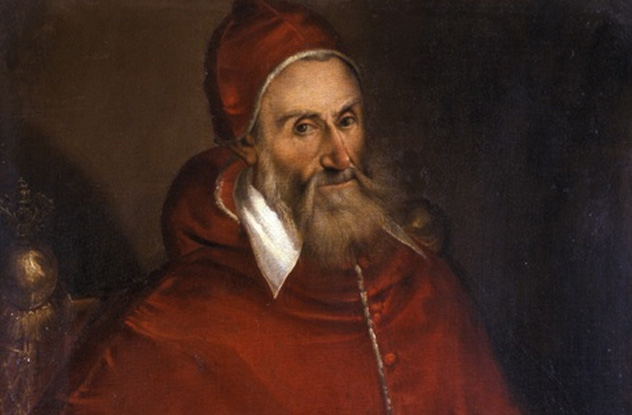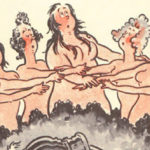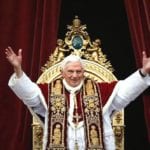10An Unsaintly Smear Campaign
Two recognized saints of the Catholic Church were once hostile rivals for the papacy. Hippolytus was the West’s most important third-century theologian. He was also an unpleasant character, judgmental, stubborn, and unforgiving. When Pope Zephyrinus died in 217, his adviser Calistus was elected as his successor, and Hippolytus opposed him for being too lenient with repentant sinners. Callistus also favored more equality within the Church, and he blessed marriages between free people and slaves. With misplaced zeal, Hippolytus proclaimed himself the real pope. He is known as history’s first antipope. Hippolytus dug up some dirt on Callistus and began a demolition job on his rival. He claimed that Callistus was once an embezzler who’d been arrested, imprisoned, released, and then arrested again. He’d allegedly tried to extort money from a synagogue, blaming Jewish businessmen for his bank’s failure. He’d been sentenced to forced labor in the mines, and he escaped and entered the Church hierarchy thanks only to a mix-up. When Callistus died, an apparent victim of anti-Christian riots, Hippolytus continued on as antipope. But in a subsequent persecution, he and Callistus’s successor Pope Pontian were thrown into the same mine in Sardinia. Realizing that he could no longer shepherd his flock, Pontian resigned, the first pope to do so. Suffering the same hardships as his fellow prisoner, and touched by his rival’s humility, Hippolytus reconciled with Pontian and Rome. They both died as martyrs in 235. Pope and Antipope share the same feast day—August 13. As for Callistus, the Church simply ignored the scandalous accusations against him and canonized him as well.
9Not Exactly A Roman Holiday
After the death of Pope Zosimus in 418, Roman deacons invaded the Lateran basilica and elected a pope of their own, named Eulalius. Higher-ranking clergy tried to enter the basilica but were violently repelled. They retreated to the church of Theodora and elected an aged priest named Boniface against the old man’s will. Rome was thrown into confusion by the rival factions. Symmachus, the Roman prefect hostile to Boniface, relayed news of the clash to Emperor Honorius in Ravenna and sought his confirmation of Eulalius. Having secured imperial approval, the partisans of Eulalius expelled Boniface from the city. The latter’s followers appealed to Honorius for reconsideration, whereupon the emperor ordered a synod to convene and settle the issue. This was the first time secular authority had interfered in a papal election. Honorius ordered both popes to stay out of Rome while the synod sorted things out. Like a referee in a boxing match, Honorius separated the two contenders by sending Boniface to the cemetery of St. Felicitas and Eulalius to Antium. As Easter approached and with the Holy See still vacant, Eulalius defiantly marched into Rome, determined to officiate over the paschal services. Imperial troops moved in to evict him and his partisans from the Lateran basilica. This brazen act was the last straw for Honorius, who finally decided against Eulalius, proclaiming Boniface the true pope on April 3, 418. To prevent such things from happening again, Honorius enacted a law that neither claimant in double elections should be recognized. Instead, a new election should be held.
8The Revenge Of The Nerd
A nephew of the bishop of Orta, Anastasius was the most learned Roman ecclesiastic of the ninth century. The degree of education he received was quite unusual for the Dark Ages. Anastasius was an author and a translator of Greek works into Latin. In 847, for unknown reasons, he abandoned his post as parish priest of St. Marcos. A Roman synod excommunicated him for his flight. He was anathematized and deposed in 853 when he failed to return. In the election of 855, Benedict III won by a majority. At this time, the co-emperors of the Western Empire, Lothair and Louis II, claimed the right to exercise authority over popes and the church. This included their approval of the pope-elect before he could be consecrated. Anastasius vowed to take his revenge. The delegates sent to Louis II to obtain his approval of Benedict’s election were secretly bribed to have the emperor confirm Anastasius instead. Upon receiving the emperor’s confirmation, Anastasius destroyed the excommunication orders against him, seized the Lateran, and threw Benedict into prison. The Romans rioted and fought in the streets in protest. The clergy, in defiance of threats of force, refused to consecrate Anastasius. Realizing that the Roman laity and clergy were united against them, the imperial party relented. After negotiations, they released Benedict to be consecrated as the duly elected pope. Once more, Anastasius was condemned by a synod. The kindly Benedict forgave him and restored him to communion. Perhaps because his great learning made him too valuable to the Church, Anastasius was even entrusted with important ecclesiastical responsibilities. In 867, he was appointed librarian of the Roman Church and became known as Bibliothecarius.
7Open Warfare
Pope Stephen X ordered that upon his death, the choice of successor should be suspended till the legate Cardinal Hildebrand returned from Germany. Hildebrand was a campaigner for ecclesiastical and papal reform. The anti-reformist Roman aristocracy pre-empted Hildebrand. Through violence and corruption, they elected John Mincius, Bishop of Velletri, as Benedict X as soon as Stephen died in 1058. The reformist Cardinal Peter Damiani refused to consecrate Benedict. The several cardinals who dared protest the anomalous proceedings were forced to flee Rome. Hildebrand was enraged by the news. At Siena, he nominated Bishop Gerhard of Burgundy and enlisted the support of Duke Godfrey of Lorraine. Gerhard was duly crowned Pope Nicholas II and pronounced Benedict deposed. Nicholas still had to battle his way to Rome in the face of Benedict’s armed supporters, but he was finally enthroned at the old St. Peter’s on January 24, 1059 amid enthusiastic acclaim. Benedict fled first to a castle in Tivoli and then to the castle of Gerardo di Galeria. Nicholas negotiated with the Normans of southern Italy for aid. With Norman troops, Nicholas campaigned against Benedict in the Campagna region. After two sieges, Benedict finally surrendered in the fall of 1059 and renounced his claim to the papacy and went into retirement. But Hildebrand (the future Pope Gregory VII) would not let Mincius off that easily. The ex-Benedict was put on public trial with Hildebrand as chief prosecutor. Mincius protested that he was just an unwilling pawn pushed forward by his ambitious relatives, but Hildebrand still had him imprisoned in the hospice of St. Agnes, where he died in 1074. Benedict X was considered a legitimate pope until the 14th century. To prevent a repeat of the fiasco, Nicholas II instituted some election reforms, stipulating that only cardinal-bishops (and not mere cardinals) had the right to vote. There must be no interference from the Roman lower clergy and laity, who could only lend their acclaim to the pope-elect. If possible, elections must be held in Rome. Simony was prohibited.
6The Interminable Election
The longest papal election in history, held in the village of Viterbo, lasted two years and three months from 1268 to 1271. In the 13th century, popes preferred to live in Viterbo to escape the pressures of Rome. Upon the death of Clement IV, the cardinals gathered in the Episcopal Palace to choose his successor. An impasse and political maneuverings sabotaged the proceedings. Concerned at what was happening, the kings of Sicily and France and Henry of Cornwall, nephew of the English king, came to Viterbo as observers. Henry got himself assassinated by his own cousins, adding to the complications. Even before this tragedy, in 1270, the impatient villagers had locked up the cardinals in the palace to force them to a decision. The cardinals protested their confinement. The palace, for one, had no toilets, and the electors had to go out when nature called. They would be subjected to heckling and harassment from the villagers. When this measure seemed to have no effect, the villagers resorted to starving the cardinals, giving them only bread and water. To prevent the princes of the Church from becoming too comfortable in their quarters, the people tore off the palace roof to expose them to the elements. Someone joked that it would let the Holy Spirit in. The tactic worked, and the cardinals at long last settled on a compromise candidate, Teobaldo Visconti. Though Teobaldo was not a cardinal nor even a priest, he became Pope Gregory X. Visconti was not even present at his election. He was away fighting in a crusade and would take eight months to return. But the idea of locking up the cardinals in one place to speed up future elections caught on. The conclave (from the Latin cum clavis or “with key”) was born. Gregory decreed in 1274 that if a conclave went beyond three days, cardinals would be restricted to one meal daily, and they must subsist on bread and water if it went beyond eight.
5‘We Want A Roman!’The Western Schism
Pope Gregory XI died in March 1378 after bringing the Holy See back to Rome following an almost 70-year captivity at Avignon, France. The Romans feared the election of a French Pope and a return to Avignon, so they sent a delegation to the Vatican to pressure the cardinals to elect an Italian, specifically a Roman. The atmosphere became ominous. Anticipating the worst, the French cardinals moved their households and valuables to Castel Sant’Angelo. Cardinal Robert of Geneva put on a coat of mail, and Spanish cardinal Pedro de Luna dictated his will. A mob gathered at the Vatican grounds, chanting, “We want a Roman!” Trembling with fear, the cardinals dressed up an old Roman colleague in papal vestments and had him appear to the crowd for long enough to give them time to escape. When the people learned afterward that they had been hoaxed, their rumblings increased. In these extreme circumstances, the electors chose a non-cardinal, Archbishop Bartolomeo Prignano of Bari, as Urban VI. He seemed an ideal candidate, able in business matters and known for his integrity and knowledge of law. But as soon as he was enthroned, Urban began to change for the worse. He became overbearing and abusive, and he quarreled with the cardinals. Many thought that he had gone insane. They repudiated Urban’s election as held under duress. Protected by Breton mercenaries, the cardinals retreated from Rome to Anagni, where they denounced Urban as “Anti-Christ, devil, apostate, tyrant, deceiver, elected-by-force.” On September 20, they elevated Robert of Geneva as Clement VII, expecting Urban to resign. Urban held on to his throne and hired mercenaries to expel Clement from Rome. The Romans sided with Urban, crying, “Death to the Anti-Christ! Death to Clement and his cardinals!” Without any safe haven for him in Italy, Clement went back to Avignon. All Europe took the side of one pope or the other. Christendom was split between two rival Sees, a schism that lasted until the next century.
4One More Vote
Siena Aenas cardinal Sylvius Piccolomini was a cultured man, widely traveled, clever, and resourceful, though physically infirm. He was a clear favorite in the 1458 conclave to choose the successor to Calixtus III. Standing in his way was the haughty and ambitious Cardinal of Rouen, Guillaume d’Estouteville. He had none of Aenas’s sterling qualities, so he resolved to gain the papal tiara by exploiting the greed of his colleagues. Estouteville dismissed his quiet, unassuming rival, saying, “What is there in this man that makes you consider him worthy of the Papacy? Will you give us a pope who is poor and gouty? How can a poor man relieve the poverty of the Church, or one who is sick heal her diseases?” Then he delivered the hook that he hoped would snare the votes: “I have royal blood in my veins. I abound in friends and riches, and I am willing to use them in the cause of the Church. I am in possession of not a few benefices, and these I shall distribute among you on vacating them.” He gave bribes and held secret meetings in the latrines. He was sure of being elected in the morning. But Aenas rallied the cardinals, saying to one, “You are a Christian; take care that you do not choose as Christ’s Vicar him whom you know to be a limb of the devil.” He conjured up the memory of the Great Schism just recently healed, and he appealed to the Italians in the group not to elect a French pope and risk the Holy See being removed once again to Avignon. Estouteville was to count the votes that day, and he counted eight for Aenas. But the latter was keeping track—he was sure he had nine. Estouteville had deliberately robbed him of one vote. There was a recount, after which it was decided to continue the voting by having the electors pronounce their choice verbally, a method called accession. Two more cardinals gave their votes to Aenas. One more, and Aenas would be Pope. Two of Estouteville’s supporters left the hall in a bid to halt the proceedings. The suspense was unbearable as Aenas’s gaze fixed on Cardinal Prospero Colonna. Seemingly hypnotized, Colonna rose. Realizing what was about to happen, Estouteville and an ally flung themselves at Colonna to shut him up by force. They struggled to drag Colonna out of the conclave, and the hall erupted into chaos and violence. Colonna managed to free himself sufficiently to cry out, “I, too, accede to the Cardinal of Siena, and make him Pope!” The conclave fell silent, and the disheveled cardinals bowed down before Piccolomini, who took the name “Pius II.”
3Money TalksThe Borgia Election
The Spaniard Rodrigo Borgia was a beneficiary of nepotism, having been made cardinal by his uncle, Pope Calixtus III. His promiscuous lifestyle, mistresses, and seven children were no secret. He was immensely wealthy, boasting that he could fill up the Sistine Chapel with his gold. Through two pontificates, he had been amassing his riches with an eye to using them to bag the greatest prize of all—the papacy. Borgia’s moment came at the opening of the conclave to choose Innocent VIII’s successor on August 6, 1492. The early favorites had been reduced to two—Borgia and Cardinal Ascanio Sforza. In a clandestine meeting, they tried to outbid each other. Sforza was staggered when Borgia enumerated his possessions on offer: sacks of money, jewels and silver plates, archbishoprics, lands, opulent abbeys, and palaces. Borgia told Sforza to take his pick. Borgia won, but Sforza preferred instant cash to unreliable promises, so Borgia forthwith dispatched four mule loads of silver (some accounts say gold) to Sforza’s palace. Sforza was also promised the vice chancellorship, a position “like unto another papacy.” Nor did Borgia forget the other conclavists. Castles, monasteries, and fortified towns were also on the bargaining table. Cardinals received dioceses and benefices with rich revenues. The unparalleled simony showed that the cardinals were not really interested in providing the Church with a spiritual leader but in increasing their revenues. Indeed, Sforza made no pretense at the opening of the August 11 session. He impatiently told his brethren to cut out the rigmarole of praying for divine guidance, commenting that in all the conclaves where he had been present, the Holy Spirit did not choose the Pope. On this occasion, Mammon, not God, had spoken—Rodrigo Borgia was unanimously elected Pope Alexander VI. The young Cardinal Giovanni de Medici was heard to remark, “Flee, we are in the hands of a wolf.”
2The Most Porous Conclave
When the despised Pope Paul IV died in 1559, Rome broke out into violence and destruction. Everyone was determined to elect a successor who was his exact opposite. But political interference by Spain and France divided the conclave into factions, preventing anyone from gaining the two-thirds majority. The deadlock dragged on from September to December. The Venetian ambassador characterized the conclave as “the most open and licentious as there ever was either in memory or in writing.” The kings, through their ambassadors, tried to fix the voting. The Spanish envoy had holes knocked out of walls so he could pass messages to Spanish cardinals. What was supposed to be a secret conclave was invaded by people not on the official list; security was lax, and doors and windows were left open. Cardinals even held banquets in defiance of rules requiring simple conclave fare. The luxury-loving Ippolito d’Este, for example, brought along a French chef who cooked him sumptuous meals. While his colleagues slept in simple temporary cubicles, d’Este had his room decorated with yards of purple cloth and silk curtains. In October, outsiders were expelled from the conclave, and the doors and windows were ordered shut and sealed. Cardinals were forbidden to share food with one another. By November, garbage and refuse had piled up in the hallways, and the stench was unbearable. There was no choice but to allow cleaners in. By December, money on hand was beginning to run out, and Rome had turned to rioting at the delay. The impatient Spanish ambassador suggested enforcing Gregory X’s decree: reduction in food if no pope was elected within three days. With a sense of urgency, the cardinals at last elected Giovanni Angelo de Medici as a compromise, willing to ignore that he had at least two illegitimate offspring. As Pius IV, he is the last Pope to have children.
1The Prankfest
The usual meddling of the secular powers resulted in the 80-day-long election of 1655. Spain and France were again jockeying for position. With 69 cardinals gathered in the Vatican, of which 32 were candidates, it was the largest conclave thus far. It made for a more complicated business of bargaining, intrigue, and bribery. The drawn-out process bored the younger cardinals. They amused themselves by gambling, and when they lost all their money, they turned to pranking the older conclavists. They glued the pages of the missal together, hoping to embarrass the prelate who officiated at Mass, but the dignified priest droned on nonetheless. They next sprinkled sneezing powder over the book. Cardinal Filomarini had to break off the next service and was assisted out of the chapel suffering from convulsions. The practical jokers also stuffed laxative powders into custard pies and had these sent to bedridden cardinals. They heard that old Cardinal Caraffa, whom they disliked, was using a secret passage from his cell to eavesdrop on a rival faction. One of them dressed up in a sheet and used the secret passage to gain entrance to Caraffa’s room. But the prelate was a light sleeper and heard suspicious sounds. When the apparent ghost glided near his bed, Caraffa gave it a well-aimed blow with his crutch. The apparition retreated in great pain back into the passageway, leaving the door open. Caraffa couldn’t get up unaided, so he couldn’t close the door, and he lay helplessly exposed to the chilly draft. He developed pneumonia and died. Eventually, the roster of candidates was whittled down, and on April 7, Fabio Chigi was elected Pope Alexander VII. The Church sorely needed him, as he was of high morals and an enemy of nepotism. One of his first acts was to put a coffin in his bedroom to remind him of his mortality.
